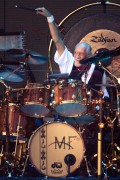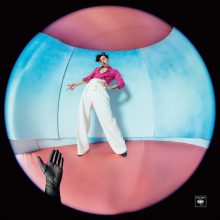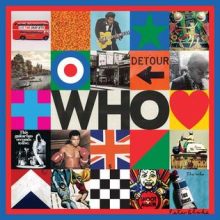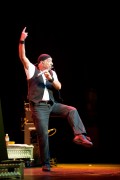The seven classic studio albums released by the Band between 1968 and 1977 will be released in a new vinyl boxset, The Band: The Capitol Albums 1968-1977.
The nine disc set includes such classics as Music From Big Pink, The Band and Stage Fright along with the double live album Rock of Ages, all remastered for vinyl from the original analog masters. The LPs are housed in a heavy-duty outer box with the original artwork and packaging faithfully recreated for each title.
From the press release:
Before stepping into their own spotlight in 1968, The Band’s members already shared an extensive collaborative history. Between 1960 and 1962, the then-teenaged multi-instrumentalists Levon Helm (drums, vocals, mandolin), Robbie Robertson (guitar, piano, vocals), Rick Danko (bass, vocals, fiddle), Richard Manuel (keyboards, vocals, drums) and Garth Hudson (keyboards, horns) first performed and recorded together as members of the backing band for Ronnie Hawkins called the Hawks. In late 1963, the Hawks struck out on their own and became Levon & the Hawks, performing and recording under this name in 1964 and 1965.
In 1965, Robertson met with Bob Dylan in New York, just as Dylan was seeking an electric guitarist for his touring band. Robertson and Helm joined Dylan at his Forest Hills and Hollywood Bowl shows, and then convinced Dylan to bring all The Hawks on for the rest of the tour. The Hawks backed Dylan on the road from October 1965 through 1966 as he incensed audiences in the U.S., Australia and Europe, performing electric sets. Disheartened by the vocally disdainful ‘folkie purist’ audience response to their first plugged-in performances with Dylan, Helm left the band in November 1965.
After the 1966 tour concluded, The Hawks woodshedded for the next year in upstate New York, often in the company of Dylan, forging a highly original sound that in one way or another encompassed the panoply of American roots music: country, blues, R&B, gospel, soul, rockabilly, the honking tenor sax tradition, Anglican hymns, funeral dirges, brass band music, folk music, and modern rock, fused and synthesized in ways that no one had ever before thought possible.
In 1967, the former Hawks were re-joined by Helm as they prepared to record their first full-length album. The Band was born in 1968 with the release of Music From Big Pink, which debuted to glowing reviews; a journalist for Life magazine wrote that The Band “dipped into the well of tradition and came up with a bucketful of clear, cool, country soul that washed the ears with a sound never heard before.” While the album only reached No. 30 on Billboard’s chart when it was released, it has become recognized over time as one of the most important albums in the history of rock, and its lead single, The Weight, a timeless rock staple.
The Band’s second, self-titled album, released in 1969, was launched with the hit Up On Cripple Creek. But it was the second single, Robertson’s Civil War song, The Night They Drove Old Dixie Down, that rose to the top of the charts (for both The Band and Joan Baez), pushing the album to gold and elevating The Band to headliner status. Both hits were sung by Helm. Two more songs from The Band would go on to become staples of FM rock radio, the rollicking Rag Mama Rag and the socially conscious King Harvest (Has Surely Come).
Stage Fright ushered The Band into the ’70s. Both the title track, sung by Danko, a reflection on the stardom they had achieved, and The Shape I’m In, featuring Manuel’s vocals, became FM favorites as album rock burgeoned into a viable format. The Band’s fourth album, 1971’s Cahoots, features the funky, New Orleans sound of Life Is A Carnival, a collaboration by Robertson, Helm and Danko, and Bob Dylan’s When I Paint My Masterpiece, which preceded Dylan’s own recorded version.
During the final week of 1971, The Band played four legendary concerts at New York City’s Academy Of Music, ushering in the New Year with electrifying performances, including new horn arrangements by Allen Toussaint and a surprise guest appearance by Dylan for a New Year’s Eve encore. Highlights from the concerts were compiled for The Band’s classic 1972 double LP, Rock Of Ages, which peaked at No. 6 on the Billboard 200 and remains a core album in the group’s Capitol catalog (in 2013, Capitol/UMe released remixed recordings from all four shows on The Band: Live At The Academy Of Music 1971).
Moondog Matinee, an album of cover songs released in 1973, features The Band’s version of Ain’t Got No Home, a 1957 R&B hit by New Orleans legend Clarence “Frogman” Henry. Helm credited Hudson with rigging up a hose he sang through to achieve “that lovely frog voice” the song requires.
The Band’s sixth studio album was Northern Lights-Southern Cross, a clever reference to their Canadian roots and their love of the American South. The 1975 album features the Dixieland-tinged Ophelia, as well as Acadian Driftwood and It Makes No Difference. Released in 1977, Islands was The Band’s final Capitol album and the last to feature the group’s original line-up. The album includes The Saga of Pepote Rouge, a typically eccentric Band song, and a cover of Georgia On My Mind.
In 1989, The Band was inducted into the Canadian Juno Hall of Fame; five years later they were accorded the same honor by the Rock and Roll Hall of Fame. In 2008, The Band was honored with The Recording Academy’s Lifetime Achievement Award.
Sadly, three members of The Band, Richard Manuel, Rick Danko and Levon Helm, have passed away, but The Band’s legacy lives on, in their recordings and in their tangible influence on popular music since they first hit the scene, wowing not only Bob Dylan, but many other major players of the day, including Eric Clapton, George Harrison, and Miles Davis. Making Americana music before the term even existed, Rick, Levon, Garth, Richard and Robbie collectively constituted the only ensemble to ever rightfully earn the sobriquet The Band.
The Band: The Capitol Albums 1968-1977 will be released on July 31.
morefr


















